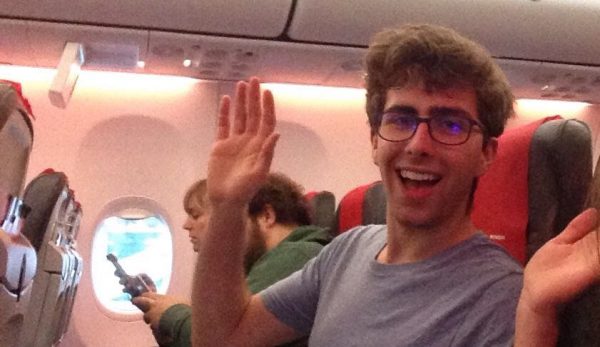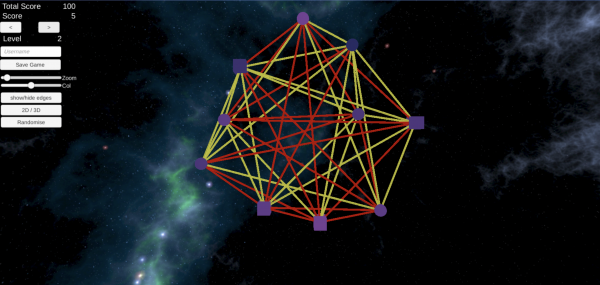
Diary of an exchange student
Cameron Calcluth is from the UK, studying physics at the University of Leeds. While shining at his home university, he heard about Erasmus opportunities and decided to try his luck in Scandinavia, at Aarhus University which attracted him the most with its fascinating research programs. During his semester abroad, he came into contact with our group and explored the opportunities of citizen science. Concluding his successful semester, he's sharing his experience from Aarhus and the story of the game called Netty. Enjoy the diary of an exchange student!
From Leeds to Aarhus
Hi, I’m Cameron! I’m from the UK (a medium-sized town in the south-east) and studying an integrated masters in Theoretical Physics at the University of Leeds. I’ve always been an avid traveler so doing a year abroad here in Aarhus seemed like a wonderful opportunity and it really has been brilliant! On my study abroad year here I’ve had the chance to work with ScienceAtHome to produce a citizen science game called Netty. But first go back the start of my journey on the way to become a physicist.
Physics really takes you to the fundamental level, it is about getting to the very bottom of how our world - and beyond - works. I’ve always been fascinated by science, ever since I was young, so when deciding on what to study at university it seemed like a very natural choice to pick physics. I decided to study my integrated master's degree at the University of Leeds as the theory group seemed to be doing really impressive research in the fields of quantum computation, information, and optics.
It’s really a broad subject and navigating all the different ancillary sciences can be tricky to an outsider, so when starting my degree I wasn’t so sure of my path towards research. In the last three years of my studies, I have had wonderful lecturers and inspiring mentors who have helped me navigate the wide variety of fields. I lucky to do two summers of paid research in the field of quantum molecular dynamics as well as other opportunities such as leadership training and ambassadorial work.
My home university puts a strong emphasis on extracurricular and horizon-broadening activities such as studying abroad. Having met a few international students who had come to Leeds, I decided I just had to experience the adventure for myself! So, I looked at a map provided by the University of all the many places I could have gone. Since I’d always wanted to try out the Nordic lifestyle I looked up the different research output at different universities in Scandinavia. To me, Aarhus seemed to be producing the most fascinating research, specifically that of Jacob Sherson as well as Klaus Mølmer and Georg Bruun. So, I wrote it down as my first choice and hoped for the best! Thankfully I was accepted and began this adventure in August 2017!

The first arrival
I wasn’t so sure what to expect since I’d never visited before the day I arrived so it was all very exciting and a little scary. Of course, there was nothing to be afraid of and the year has been truly outstanding thanks to the fantastic experiences and the wonderful friendships I’ve made. My supervisor and director of SAH, Jacob Sherson, is a quantum physicist focussing on quantum control and computation. This is so exciting to me! I find it fascinating to learn how we can manipulate quantum objects which are so impossibly small and utilize them to compute incredibly important tasks to the benefit of almost every corner of science, technology, and health.
I played the Quantum Moves game, the flagship game from ScienceAtHome before I came to Denmark and really loved the concept. It’s a great idea - taking human intuition, quantifying it, and turning it into real applicable physics. The community of ScienceAtHome has been so helpful. I’ve been able to discuss stimulating and fascinating ideas with outstanding physicists as well as have help from game developers and marketing directors to make my dream project a reality!
Netty
I have been studying the physics behind the 100M kroner DWave quantum computer. The problem it attempts to solve is called a “spin glass” energy minimization. You may have heard that glass is actually a liquid. This is wrong! However, it does have an interesting property that liquids possess: the molecules have no internal structure. They are randomly organized. It’s as if you took a liquid and froze the atoms in place, so they are randomly organized yet maintain local positions.
In a spin glass, all of these atoms also have a spin which, due to quantum mechanics, can only have a value pointing up or down. There is no in-between when you measure its value. However, these spins interact with each other which complicates things. Often we are interested in finding what the lowest possible energy of this arrangement of atoms can be.
Unfortunately, this is what computer scientists call an NP-Hard problem. This means it is extremely difficult to find the lowest energy solution. In fact, for just 70 atoms there are more ways of arranging the spins than there are stars in the observable universe! So going through each one, calculating the energy and picking the best one isn’t a viable option!
We can think of all the different possibilities as the countryside (although a 70 dimensional one!) with hills (maxima) and valleys (minima). We want to find the lowest point in this landscape. A number of different algorithms exist which tries to find this minimum. For example, we could send out a searcher who walks down each point which has the steepest gradient. This is a great technique if we have a single valley. However normally our landscape is much wilder, and has dips and mini hills all over the place! The searcher will get stuck very quickly and declare some small micro valley to be the lowest point, which is obviously not the case.
DWave has built a machine which uses the quantum property of spins to tunnel through the energy landscape and finds the energy minimum. Physically this is kind of like the searcher splitting up and creating tunnels through the land in different directions. As we decrease the tunneling the pieces of the searcher that are at the lowest points linger for longer until the searcher is fully recovered, with every piece, to the lowest point!

This is where Netty comes in! Quantum Moves has demonstrated that human intuition is particularly good at solving certain types of problems even better than state of the art algorithms. Perhaps with Netty, we could do the same but for this new problem. DWave is very fast, however classical computers have had over half a century to perfect their speed and are incredibly efficient problem-solving devices! My hope is that by combining human intuition with classical algorithms we will be able to outperform this quantum machine.
Into the future
I heading back to Leeds for one year where I will continue my research scholarship and then begin my master's thesis where I’m planning to look at majorana fermions. I would like to continue in research until the Ph.D. level and potentially beyond. My plan so far is to develop a business in quantum technologies and I recently found out that I have been successful in my application of a scheme which pairs international CEOs with final year students in order to help them further their career. Although I am very sad to leave Denmark, equally I can’t wait to start next year, inspired by the year I've spent at Aarhus University!
Play Netty and help Cameron gathering enough data for his research! We were glad at ScienceAtHome to have him collaborating with our team and wish him all the best in his future career...and who knows, maybe his path will encounter ScienceAtHome again!
